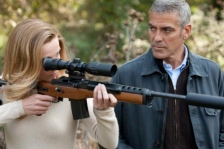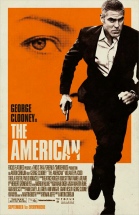The American
|  Dutch-born director Anton Corbijn began his career as a landscape photographer before moving into the world of documenting alternative and new wave rock bands and directing their videos in the 1980s and ’90s. His subjects included David Bowie, U2, R.E.M., Nirvana, and especially Depeche Mode, for whom his images became a kind of visual analogue to their dark, moody sound. Moreso than other celebrity photographers of his era, Corbijn had a way of capturing his subjects’ dark edges, suggesting a sense of loneliness amid all of the celebrity hoopla. It was not surprising that, when Corbijn turned to directing features, his first film was Control (2007), a biographical portrait of the British new wave band Joy Division and their troubled lead singer Ian Curtis. Dutch-born director Anton Corbijn began his career as a landscape photographer before moving into the world of documenting alternative and new wave rock bands and directing their videos in the 1980s and ’90s. His subjects included David Bowie, U2, R.E.M., Nirvana, and especially Depeche Mode, for whom his images became a kind of visual analogue to their dark, moody sound. Moreso than other celebrity photographers of his era, Corbijn had a way of capturing his subjects’ dark edges, suggesting a sense of loneliness amid all of the celebrity hoopla. It was not surprising that, when Corbijn turned to directing features, his first film was Control (2007), a biographical portrait of the British new wave band Joy Division and their troubled lead singer Ian Curtis.On the surface, then, The American would seem a strange sophomore effort. A mysterious, purposefully elliptical and ambiguous existential thriller set primarily in a small village high in the Italian Apennines, it seemingly has no connection with Corbijn’s previous works, virtually all of which revolve around musicians and celebrities. Yet, The American, which is based on the novel A Very Private Gentleman by British author Martin Booth, is in many ways the perfect extension and elaboration of Corbijn’s special penchant for drawing the solemn interiors out of well-known subjects and making them, in effect, more human. His images may be highly stylized, but they have the ironic effect of bringing their larger-than-life subjects down to earth and making them strangely relateable. The film’s main character played by George Clooney is a middle-aged man whose name may be Jack or it may be Edward or it may be neither. His background is never explained, and from the film we glean that he is some kind of professional assassin whose expertise is in designing and building weapons for very specific purposes. At the beginning of the film he is in Sweden with a beautiful woman (Irina Björklund), but the manner in which Corbijn and cinematographer Martin Ruhe (who also shot Control) frame the snowy landscape and fire-lit idyll inside their wooden cabin suggests that danger is everywhere, a fear that is soon realized and forces Jack to go back on the run. He is aided by a handler named Pavel (Johan Leysen), who tells him to hide out in a small Italian villa and work on an assignment. “You don’t even have to pull the trigger,” Pavel tells him, because he will be building a sniper rifle for a female assassin named Mathilde (Thekla Reuten) whose target is never named. “I assume I’ll read about in the paper,” Jack says, indicating that he is likely assisting in the assassination of a major public figure. Pavel’s other directive is for Jack to not make any friends, the reasoning for which is amply demonstrated in the film’s brutal opening sequence. Yet, Jack has a hard time staying completely to himself, even though most of his time is spent in his small apartment hardening his already hard body (which still displays the unmistakable signs of a long, weary life) and machining the sniper rifle out of various parts. He strikes up a tentative relationship with a local priest, Father Benedetto (Paolo Bonacelli), a friendly but nosy sort who senses in Jack a man who is hiding (from) something--many things, in fact. He also develops a relationship with a sweet and naïve prostitute named Clara (Violante Placido), which quickly overflows the professional bounds between service provider and client. The plot, while crucial to the film’s underlying existential dread, ultimately plays second to the film’s mood and tone, which evokes not so much the ’70s-era American paranoid thrillers to which it will most likely be compared, but rather the cinema of French auteur Jean-Pierre Melville, who had a special affinity for professional criminals trapped on tragic paths. Like Le Samouraï (1967), probably Melville’s best known film, The American is a deeply interior film in which precious little happens on the surface; instead, its power resides just beneath the surface, with every action, however seemingly insignificant, imbued with great existential angst. Clooney’s character says very little throughout the film,and when he does, it suggests a man who is, as Father Benedetto puts it at one point, trapped in his own hell. He goes through the motions of his notorious profession, and he is clearly a pro at what he does, but there is never any sense that he derives satisfaction from it; it’s a job, he’s good at it, therefore he does it. Yet, the life he is forced to lead requires that he be alone even when he’s with others, which Corbijn emphasizes by constantly placing Clooney in the corners of the ’Scope frame, dominated by not only expansive landscapes, but by minimalist interiors whose empty spaces visually reflect his empty life. Although best known for his old-style Hollywood charm, Clooney in recent years has found success mining a deeper vein of loss and heartbreak, whether it be his confused corporate hatchet man in Up in the Air (2009) or the eponymous lawyer regaining his conscience in Michael Clayton (2007). Like those films, The American, which is slow, methodical, and riveting, benefits from Clooney’s ability to draw deep inside himself, thus turning his matinee exterior into a hardened shell that possibly has nothing inside. The emotional drive of the film hinges on whether or not he can regain his soul, and the fact that this weighs heavily on his relationship with the clichéd prostitute with a heart of gold is possibly the film’s only true weak link. But, even then Violante Placido transcends the cliché, turning Clara into a fully realized character in precious few scenes and making it clear why Jack might see in her an escape from the life into which he has trapped himself. Copyright ©2010 James Kendrick Thoughts? E-mail James Kendrick All images copyright © Focus Features |
Overall Rating: 


 (3.5)
(3.5)


